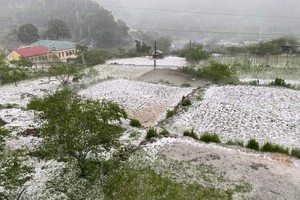Ridding the internet of spam and phishing SMS is very difficult and takes a lot of time. However, if there is good coordination between authorized organizations, businesses and customers, this problem will be solved, Dr Vu Quoc Khanh, director of Vietnam Computer Emergency Response Teams (VNCERT), told SGGP March 17.

VNCERT is under the Vietnam Ministry of Information and Communications. The Ministry assigned VNCERT to create an overall strategy and deploy activities to reduce and prevent spam and fraudulent SMS messages in Vietnam.
SGGP: Spam and phishing are becoming a large problem with mobile cell services. What should we do to prevent this and protect consumers’ interests?
Dr Khanh: Spam and phishing have increased. Prepaid number management has not been carried out very well, thus, many businesses and individuals take advantage of this gap to send fraudulent messages.
The Ministry of Information and Communications’ Circular 12, Decree 90 on spam and fraudulent messages, come into effect on February 9.
According to the circular, when businesses provide mobile content and advertisers want to advertise through the internet or mobile phones, they have to ask for a code.
However, up till now there just three out of 160 businesses have completed the paperwork and got the advertisement code.
At present, most advertising messages violate the Decree on spam messaging. We have asked businesses without codes to stop advertising through SMS.
What would VNCERT do when it discovers a business or an individual phishing?
VNCERT’s role is not to punish but manage and check. Inspectors from the Ministry of Information and Communication will investigate cases. However, VNCERT has the right to ask to withdraw service codes of businesses violating the law.
VNCERT can also coordinate with the Ministry’s inspectors to check and investigate matters related to fraudulent messages. VNCERT has the right to ask to collect all revenue created from fraudulent messages.
The most common phishing message that causes annoyance for cell phone users are messages advertising false products of service providers. These fraudulent and enticing messages are mainly from pre-paid numbers.
These messages have left people with an unsympathetic view of advertisement through cell phones. This affects the prestige of serous content service providers.
Thus, it is necessary to tighten state management and businesses’ activities.
When a problem occurs, consumers will be the ones who lose out most. What should we do to minimize costs to consumers?
First of all, cell users should heighten vigilance with fraudulent messages because they will decide if they participate in that service or not. If people are cautious and not easily enticed, they can prevent damaging costs themselves.
At present, VNCERT is establishing an information gate for the anti-spam and fraudulent messages. In that gate, cell users can freely send messages to ask about phishing messages, as well as to ask for help when they receive fraudulent messages.
With the new information gate, we will have enough figures about time, place, and businesses sending fraudulent messages.
Otherwise, to prevent spam and phishing, it is necessary to have the attention of three sides, customers, businesses and authorized organizations, such as VNCERT.
If people are willing to report and complain when they suffer from fraud and there is a close coordination between businesses and authorized organizations, we can control fraudulent messages.
When there is coordination between investigators and technology, we are able to find out who sends the messages, where they are and how they conduct fraudulent messages.
This process will take a lot of time and meet a lot of difficulties. I believe that we can overcome these difficulties.
Relating to prepaid numbers, the Chief Inspector of the Ministry of Information and Communications, Nguyen Thanh Hai, said March 17 that the Ministry will verify inspection results. Then, the Ministry will punish businesses breaking the law in trading and managing prepaid numbers. |
Related article:
SMS fraud, spam annoy cellphone users
























